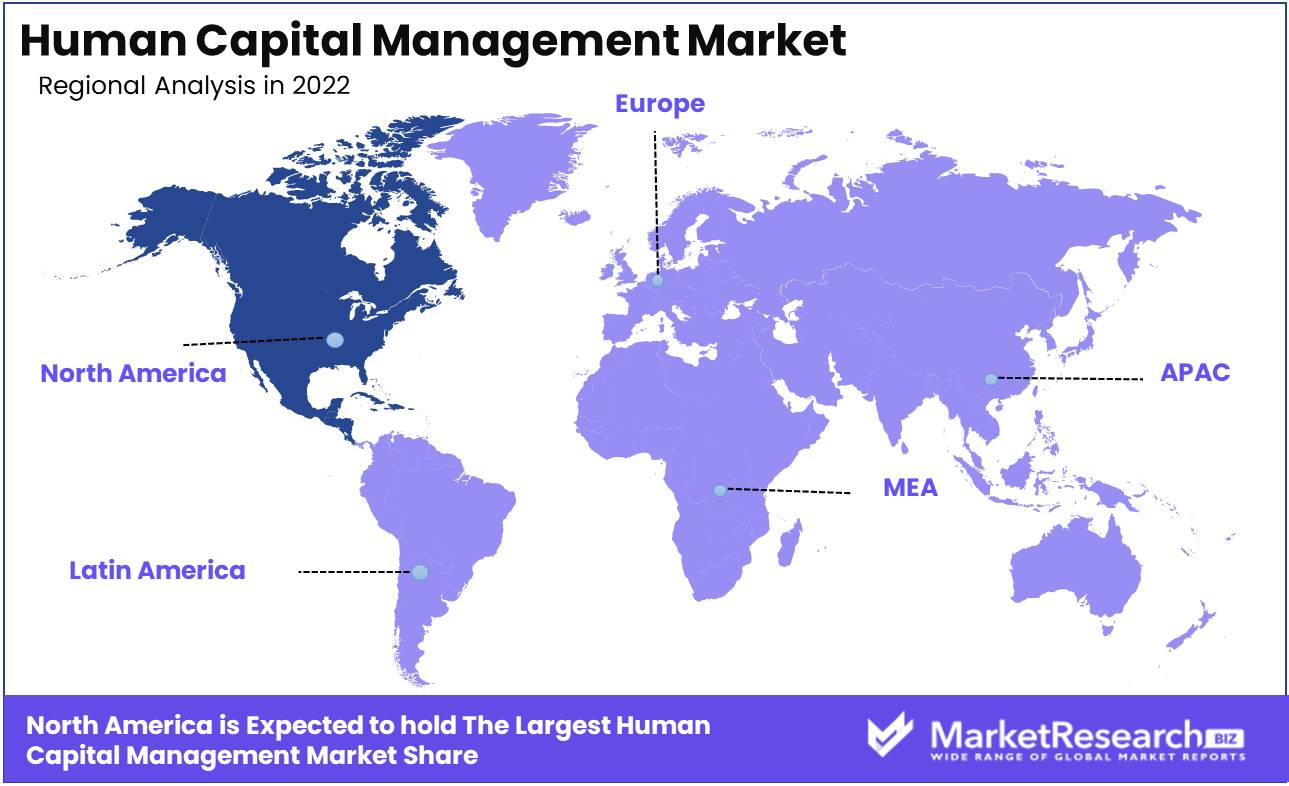
Human Capital Management Market By Deployment Model (On-Premises, Cloud-Based), By Industry Vertical (BFSI (Banking, Financial Services, and Insurance), IT and Telecom, Healthcare and Life Sciences, Manufacturing, Retail and Consumer Goods, Government and Public Sector, Other Industry Verticals), By Region And Companies - Industry Segment Outlook, Market Assessment, Competition Scenario, Trends, And Forecast 2023-2032
-
20640
-
April 2023
-
187
-
-
This report was compiled by Correspondence Linkedin | Detailed Market research Methodology Our methodology involves a mix of primary research, including interviews with leading mental health experts, and secondary research from reputable medical journals and databases. View Detailed Methodology Page
-
Report Overview
Human Capital Management Market size is expected to be worth around USD 55.2 Bn by 2032 from USD 24.7 Bn in 2022, growing at a CAGR of 8.6% during the forecast period from 2023 to 2032.
In the current highly competitive business environment, organizations are placing a greater emphasis on their most valuable asset: their employees. Human Capital Management (HCM) has emerged as an essential discipline, comprising a variety of practices and strategies designed to maximize the value an organization obtains from its workforce. Human Capital Management (HCM) is a comprehensive approach to attracting, developing, engaging, and retaining talent within an organization's personnel. Human Capital Management's primary objective is to align the organization's human resources with its strategic goals, thereby facilitating improved decision-making and fostering sustainable business performance. By employing HCM practices, businesses can optimize their recruitment and selection processes, streamline performance management and learning initiatives, increase employee engagement, and shape a positive organizational culture.

HCM's significance in the modern business environment cannot be exaggerated. Effective HCM practices allow businesses to obtain a competitive advantage by maximizing the potential of their workforce. By investing in HCM, businesses can increase employee satisfaction and productivity, reduce turnover, reduce recruitment expenses, and foster innovation. In addition, HCM enables organizations to build a strong employer brand, attracting top talent and transforming them into employers of choice. Human capital management is a source of enduring competitive advantage that increases the likelihood of long-term success for organizations that prioritize it.
In recent years, the Human Capital Management Market has witnessed significant innovation, driven by technological advancements and shifting workforce dynamics. Integration of artificial intelligence (AI) and machine learning (ML) into HCM solutions is one such innovation. HCM platforms powered by AI can automate administrative duties, analyze vast amounts of data to provide actionable insights and personalize the employee experience. ML algorithms can assist organizations in recognizing patterns and anticipating future workforce trends, thereby enhancing their talent acquisition, succession planning, and workforce planning capabilities.
Increased emphasis on talent management, employee engagement, and workforce analytics have propelled the Human Capital Management Market's robust expansion. Diverse industries have recognized the importance of investing in HCM to promote business success. For instance, the healthcare industry has adopted HCM solutions to optimize workforce scheduling, enhance patient care, and comply with regulations. In a similar fashion, the retail industry has adopted HCM platforms to streamline recruitment, onboarding, and training procedures, resulting in enhanced customer service and sales performance.
Multiple factors influence the expansion of the Human Capital Management Market. First, the increasing adoption of cloud-based HCM solutions has fueled market growth, as these solutions offer scalability, flexibility, and cost-effectiveness in comparison to on-premises systems. Second, organizations have invested in HCM platforms with real-time analytics and predictive capabilities in response to the rising demand for data-driven decision-making. Thirdly, the increasing emphasis on employee engagement and well-being has prompted businesses to pursue HCM solutions that facilitate continuous feedback, recognition, and work-life balance.
Driving Factors
Increasing emphasis on talent management and employee participation
Human Capital Management (HCM) emphasizes the significance of attracting, developing, and retaining top talent in a dynamic business environment. Increasing emphasis on talent management and employee engagement has contributed to this growing consciousness. Companies recognize the importance of a motivated workforce amidst intense competition in the job market. Management of talent is essential for achieving organizational objectives and maintaining competitive advantage. It includes strategies to attract, develop, and retain competent individuals who fuel innovation, productivity, and growth. When talent management is elevated, human resources are aligned with business objectives, and qualified individuals are placed in suitable roles. This precision increases employee engagement, satisfaction, and productivity, thereby unlocking their potential.
The Development of the Markets for Workforce Analytics and HR Technology
The market for Human Capital Management has been transformed by the emergence of workforce analytics and HR technology. Today's organizations possess voluminous personnel data, which is exploited by sophisticated analytics and technology. This data-driven strategy enables informed decision-making through insights obtained from employee data trends and patterns. Facilitates strategic personnel planning, talent optimization, and organizational performance improvement. From recruitment to learning, revolutionary HR technology streamlines processes by providing accessibility, flexibility, and automation on a unified platform.
Expansion of Mobile and Cloud-Based HR Solutions
The proliferation of mobile and cloud-based HR solutions has revolutionized Human Capital Management. These solutions facilitate remote work by providing access to HR systems in real-time. Cloud-based platforms offer secure data storage and eliminate the need for manual procedures. Self-service capabilities are extended to employees, while mobile applications improve the accessibility of tasks such as time-off requests, evaluations, and training. This synergy between technology and Human Capital Management enhances employee engagement and streamlines operations, signifying a modern trend in the workplace.
Increasing Demand for HR Process Automation and Efficiency
Human Capital Management (HCM) is reshaping the market by incorporating automation and efficacy into modern HR practices. Utilizing technological advancements, organizations are reshaping HR operations. Payroll, benefits, and compliance are streamlined through automation, saving time and assuring accuracy. AI-powered systems accelerate candidate screening and selection, thereby accelerating and improving the recruitment process.
Restraining Factors
Potential Resistance to Change and Adoption of New HR Technologies
Adopting new HR technologies is crucial for gaining a competitive advantage in today's dynamic business climate. Change resistance is a significant obstacle in the Human Capital Management (HCM) realm. Employees and management may be hesitant to adopt these innovations due to the associated uncertainties and concerns. This resistance is fueled by job security concerns and unfamiliarity with the new systems. Organizations must implement a robust change management strategy, including effective communication, training, and support, to combat this. Involving employees and addressing their concerns can cultivate a change-friendly environment.
Potential Data Privacy and Security Concerns
In Human Capital Management (HCM), the proliferation of digital platforms and cloud-based solutions has heightened data security concerns. The adoption of HR technology is hindered by potential data breaches and unauthorized access, which must be addressed. Prioritizing data privacy is essential for building stakeholder trust. This requires implementing stringent security measures, such as encryption and firewalls. Observing data protection regulations is essential for legal compliance and protecting employee privacy. Organizations can assuage data security concerns and advance in the HCM market by proactively addressing these issues.
Potential Integration Challenges with Existing HR Systems
Integration of new HR technologies with extant systems is necessary for effective Human Capital Management. Incompatibilities between various technologies can create operational obstacles. Integrating these technologies seamlessly is essential for preventing data silos, duplication, and decreased productivity. However, integration initiatives can be expensive and labor-intensive. Organizations can address this challenge by evaluating their current HR systems, establishing integration objectives, and collaborating with vendors or IT specialists to develop a customized implementation plan that minimizes disruptions and maximizes efficiency.
Potential Customization and Configuration Complicatements
Implementing Human Capital Management (HCM) solutions can be hindered by customization complexities, as HR requirements vary between organizations. Standard solutions may necessitate extensive modifications, causing delays, additional costs, and maintenance issues. To mitigate this, adaptable HCM technologies are essential. Customization reduction reduces complexity, costs, and compatibility issues. Collaboration between HR and IT determines optimal customization levels for unique organizational requirements.
Deployment Model Analysis
The emergence of cloud-based solutions has had a substantial impact on the human capital management (HCM) market. Cloud-based HCM solutions offer numerous benefits, including scalability, adaptability, cost-effectiveness, and simplicity of implementation. Consequently, cloud-based solutions dominate the HCM market.
Emerging economies' economic growth has played a crucial role in propelling the adoption of cloud-based HCM solutions. These economies are experiencing rapid economic expansion and globalization, which is attracting multinational corporations and foreign investments. As businesses expand their operations in these regions, they need HR management systems that are efficient and effective. Cloud-based HCM solutions offer a scalable and cost-effective solution to meet the diverse requirements of these businesses.
Trends and behaviors of consumers toward cloud-based HCM solutions have also contributed to their market dominance. Modern employees anticipate seamless access to HR services regardless of device or location. The mobile-friendly and user-friendly interface of cloud-based solutions enables employees to readily access HR information, submit requests, and communicate with their HR teams. This convenience has prompted businesses of all sizes to employ more cloud-based HCM solutions.
Industry Vertical Analysis
On the market for human capital management, the IT and Telecom segment is dominant. This segment consists of corporations in the information technology and telecommunications industries. To remain competitive in a fast-paced and ever-changing market, these industries have specific HR needs, such as employing based on skills, ongoing training, and talent retention.
The growth of emerging nations has contributed to the IT and Telecom segment's dominance in the HCM market. These economies seek to establish themselves in the global IT and telecom markets in order to entice multinational corporations to invest in them. As businesses expand their operations in these regions, they need sophisticated HR management systems to effectively manage their IT and telecom workforce. HCM solutions tailored to the specific requirements of the IT and telecommunications industries have garnered considerable traction.
In the HCM market, consumer trends and behavior also favor the IT and Telecom segment. The IT and telecommunications industries are renowned for their dynamic and fast-paced work environments. Employees in these industries anticipate cutting-edge HR technologies, such as skills assessment instruments, learning management systems, and performance monitoring systems. In high demand are HCM solutions that appeal to the specific needs of the IT and telecom industries.

Key Market Segments
By Deployment Model
- On-Premises
- Cloud-Based
By Organization Size
- Small and Medium-sized Enterprises (SMEs)
- Large Enterprises
By Component
- Software
- Services
By Industry Vertical
- BFSI (Banking, Financial Services, and Insurance)
- IT and Telecom
- Healthcare and Life Sciences
- Manufacturing
- Retail and Consumer Goods
- Government and Public Sector
- Other Industry Verticals
Growth Opportunity
The Advancement of Cloud-Based HCM Solutions Raising the Bar
Cloud-based solutions are rapidly acquiring popularity, providing businesses with flexible and scalable means to efficiently manage their workforce. HCM providers deliver seamless, user-friendly platforms that streamline HR functions, including payroll, attendance monitoring, talent acquisition, and performance evaluation, using cloud technology. The growth trajectory is fuelled by the incorporation of cutting-edge AI and ML technologies, which enable predictive HR analytics. The market for Cloud-based Human Capital Management is projected to expand, creating opportunities for both established and new participants.
Globalization and Regionalization Utilizing Emerging Markets
Geographical boundaries do not limit its scope. Expansions of global businesses emphasize the need for localized HCM solutions. Unrealized growth potential exists in emerging markets, where changing HR practices present unique challenges in workforce management, compliance, and HR process localization. Adapting HCM platforms to these markets enables providers to acquire new clients and strengthen their position. Partnering with local HR professionals enhances understanding of regional requirements and offers comprehensive solutions tailored to the market.
Employee Experience and Self-Service Capabilities Empowering the Workforce
The employee experience is of paramount importance to the profitability of an organization. To ensure the retention and engagement of personnel, HCM providers must prioritize the creation of positive, seamless experiences. This entails facilitating self-service functions, thereby empowering employees to independently manage their HR tasks. The incorporation of customized interfaces, social tools, and mobile applications increases employee engagement and fosters a sense of community. By emphasizing intuitive interfaces and user experience, HCM providers can solidify their market position and stimulate expansion.
Enhanced Security and Compliance Safeguarding Sensitive HR Data
In a world of escalating data breaches and cyber threats, the protection of sensitive HR information is of the uttermost importance for businesses. HCM vendors who prioritize data security via encryption, multi-factor authentication, and vulnerability assessments obtain a competitive advantage. Stricter compliance measures, such as GDPR and ISO 27001 certifications, demonstrate a commitment to privacy regulations, thereby fostering confidence. As organizations become more wary of data protection, an HCM platform that ensures HR data security attracts clients and drives market growth.
Latest Trends
Emerging Trends in Human Capital Management
In recent years, the demand for talent management and recruitment modules within Human Capital Management (HCM) systems has significantly increased. This shift reflects companies' increasing awareness of the critical significance of attracting, cultivating, and retaining top-tier talent for sustaining growth. As competition for qualified professionals intensifies, more and more organizations are turning to HCM solutions with robust talent management capabilities. These specialized modules optimize recruitment strategies by streamlining the hiring process, automating repetitive duties, and providing in-depth analytics.
Effective Workforce Planning Utilizing Data-Driven Insights
Utilization of data-driven HR analytics for workforce planning is a key trend that is reshaping the HCM landscape. The profusion of accessible data enables organizations to make well-informed workforce decisions. By closely analyzing essential metrics such as employee performance, engagement levels, and retention rates, businesses can proactively identify talent gaps, anticipate future needs, and devise effective strategies to resolve them. The incorporation of sophisticated analytics tools into Human Capital Management systems has revolutionized workforce planning, enabling organizations to align human resources with overarching business goals.
Impact Revolutionary of Mobile and Social HR Platforms
The emergence of mobile and social HR platforms is reshaping the interaction between employees and Human Capital Management systems. Given the prevalence of smartphones and social media, employees now anticipate intuitive and user-friendly interfaces that provide mobile access to HR information. Mobile-enabled HCM platforms enable employees to manage personal information, request time off, access benefits, and interact fluidly with coworkers and managers, all from the comfort of their smartphones. The addition of features such as immediate messaging and collaboration tools increases employee engagement and fosters a stronger sense of community within the organization.
Enhancing Workforce Care through Participation and Performance Management
The adoption of employee engagement and performance management tools is causing a paradigm shift in the manner in which businesses cultivate and develop their workforce. Organizations are investing in Human Capital Management solutions that provide comprehensive engagement and performance management capabilities due to the direct correlation between engaged employees and increased productivity and loyalty. These tools promote seamless collaboration between managers and employees by facilitating continuous feedback, goal setting, performance evaluations, and career development conversations. By fostering a culture of continuous improvement, organizations can unlock the complete potential of their workforce, thereby propelling long-term success.
Regional Analysis
Human Capital Management (HCM) Market Dominated by the North American RegionIn the ever-changing and fast-paced business world, it has become increasingly important for organizations to effectively manage their most valuable asset: human capital. Human Capital Management (HCM) has emerged as a strategic approach that concentrates on maximizing the value of human resources through effective strategies for recruitment, development, and retention. As businesses around the world recognize the importance of human capital management (HCM), North America has emerged as the market leader.
North America's dominance in the Human Capital Management market is evident in a variety of ways. First, a considerable number of established and emerging companies in the region have recognized the need to invest in HCM solutions to remain competitive in today's talent-driven environment. These businesses, which vary from small startups to multinational conglomerates, are all attempting to optimize their human resource processes in order to improve organizational performance.
In addition, the dominance of the Human Capital Management market in North America can be attributed to the presence of prominent technology providers and software companies specializing in HCM solutions. These providers offer comprehensive and innovative software platforms that cater to the diverse requirements of businesses, allowing them to streamline HR operations, improve workforce analytics, and boost employee engagement. These solutions' sophisticated functionalities enable organizations to make decisions based on data, resulting in increased productivity and overall business outcomes.
In addition, the dominance of North America in the Human Capital Management market can be attributed to the region's emphasis on talent development and continuous learning. HCM solutions that facilitate learning and development initiatives are in high demand as organizations recognize the significance of upskilling and reskilling their workforce to remain competitive in a swiftly changing business environment. The North American emphasis on fostering a culture of learning within organizations aligns perfectly with the capabilities of sophisticated HCM platforms, making it the region of choice for businesses seeking comprehensive talent management solutions.

Key Regions and Countries
North America
- US
- Canada
- Mexico
Western Europe
- Germany
- France
- The UK
- Spain
- Italy
- Portugal
- Ireland
- Austria
- Switzerland
- Benelux
- Nordic
- Rest of Western Europe
Eastern Europe
- Russia
- Poland
- The Czech Republic
- Greece
- Rest of Eastern Europe
APAC
- China
- Japan
- South Korea
- India
- Australia & New Zealand
- Indonesia
- Malaysia
- Philippines
- Singapore
- Thailand
- Vietnam
- Rest of APAC
Latin America
- Brazil
- Colombia
- Chile
- Argentina
- Costa Rica
- Rest of Latin America
Middle East & Africa
- Algeria
- Egypt
- Israel
- Kuwait
- Nigeria
- Saudi Arabia
- South Africa
- Turkey
- United Arab Emirates
- Rest of MEA
Key Players Analysis
Oracle Corporation, a global leader in enterprise software solutions, has established a solid footing in the Human Capital Management market with its innovative and extensive product line. Oracle's HCM Cloud offers organizations a scalable and integrated platform for human resource management, talent acquisition, employee engagement, and workforce optimization. Oracle's sophisticated AI-driven analytics and automation capabilities enable companies to make data-driven decisions and increase employee satisfaction.
SAP SE, a German multinational software corporation, has positioned itself as a leader in the Human Capital Management market by providing organizations with intelligent HR solutions that expedite HR processes, improve employee experiences, and facilitate strategic workforce planning. SAP SuccessFactors, SAP's flagship HCM product, integrates cutting-edge technologies such as AI, machine learning, and predictive analytics to provide actionable insights, enhance talent management, and promote a culture of continuous learning within organizations.
Utilizing its cognitive computing capabilities, IBM, a renowned leader in the technology industry, has made significant advances in the Human Capital Management market. IBM Watson Talent Insights, a talent management solution enabled by AI, enables organizations to analyze and comprehend workforce data, identify skills gaps, and make informed decisions regarding talent acquisition, development, and retention. With IBM's emphasis on cognitive talent management, businesses can harness the power of AI to optimize their workforce and accomplish their strategic goals.
NetSuite Inc., an Oracle subsidiary, provides a cloud-based HCM solution that meets the requirements of expanding businesses. The HCM module of NetSuite offers an all-encompassing platform for managing essential HR processes, employee self-service, benefits administration, and payroll. With its scalability, adaptability, and seamless integration with other NetSuite products, organizations can optimize their HR operations, reduce administrative costs, and devote more time to strategic endeavors.
Top Key Players in Human Capital Management Market
- Oracle Corporation (U.S.)
- SAP SE (Germany)
- IBM (U.S.)
- NetSuite Inc. (U.S.)
- Workday Inc. (U.S.)
- Ultimate Software Group Inc. (U.S.)
- ADP LLC (U.S.)
- Cornerstone OnDemand (U.S.)
- Benefitfocus Inc. (U.S.)
- BambooHR (U.S)
- PeopleFluent (U.S)
- Ultimate Software Group Inc. (U.S)
- Zoho Corporation (India)
- WebHR (U.S)
- CakeHR (U.K)
- Epicor Software Corporation (U.S)
- Infor (U.S)
- Kronos Incorporated (U.S)
- The Sage Group plc. (U.S)
Recent Development
- In 2023, SAP, a renowned leader in enterprise software solutions, set the stage by announcing plans to introduce a user-friendly, cutting-edge HCM platform. SAP strives to provide organizations with an intuitive and streamlined approach to managing their human resources, fostering efficiency and productivity throughout the entire employee lifecycle, with a focus on the user experience.
- In 2022, Oracle made headlines with the announcement of a significant increase in HCM production capacity in India. Oracle intends to optimize its Human Capital Management (HCM) offerings by leveraging the country's vast talent pool and expanding its technological infrastructure. Oracle hopes that by enhancing its capabilities, it will be better able to satisfy the rising demand for advanced HCM solutions and also contribute to the Indian economy.
- In 2021, In a game-changing move, Workday partnered with Google Cloud to establish an innovative HCM collaboration. Workday aspires to create a revolutionary HCM solution that meets the specific requirements of modern businesses by leveraging Google Cloud's extensive expertise and resources. This symbiotic partnership aims to combine Workday's comprehensive HCM capabilities with Google Cloud's robust infrastructure, promising customers an unrivaled human capital management experience.
- In 2020, Ultimate Software's acquisition of Kronos, a prominent HCM software provider, created ripples in the HCM market. This strategic move enabled Ultimate Software to expand its portfolio of offerings, thereby reinforcing its leadership position in the HCM market. The acquisition aligned with Ultimate Software's dedication to providing comprehensive HCM solutions, which enable businesses to optimize workforce management and promote sustainable growth.
Report Scope
Report Features Description Market Value (2022) USD 24.7 Bn Forecast Revenue (2032) USD 55.2 Bn CAGR (2023-2032) 8.6% Base Year for Estimation 2022 Historic Period 2016-2022 Forecast Period 2023-2032 Report Coverage Revenue Forecast, Market Dynamics, COVID-19 Impact, Competitive Landscape, Recent Developments Segments Covered By Deployment Model (On-Premises, Cloud-Based)
By Organization Size (Small and Medium-sized Enterprises (SMEs), Large Enterprises)
By Component (Software, Services)
By Industry Vertical (BFSI (Banking, Financial Services, and Insurance), IT and Telecom, Healthcare and Life Sciences, Manufacturing, Retail and Consumer Goods, Government and Public Sector, Other Industry Verticals)Regional Analysis North America – The US, Canada, & Mexico; Western Europe – Germany, France, The UK, Spain, Italy, Portugal, Ireland, Austria, Switzerland, Benelux, Nordic, & Rest of Western Europe; Eastern Europe – Russia, Poland, The Czech Republic, Greece, & Rest of Eastern Europe; APAC – China, Japan, South Korea, India, Australia & New Zealand, Indonesia, Malaysia, Philippines, Singapore, Thailand, Vietnam, & Rest of APAC; Latin America – Brazil, Colombia, Chile, Argentina, Costa Rica, & Rest of Latin America; Middle East & Africa – Algeria, Egypt, Israel, Kuwait, Nigeria, Saudi Arabia, South Africa, Turkey, United Arab Emirates, & Rest of MEA Competitive Landscape Oracle Corporation (U.S.), SAP SE (Germany), IBM (U.S.), NetSuite Inc. (U.S.), Workday Inc. (U.S.), Ultimate Software Group Inc. (U.S.), ADP LLC (U.S.), Cornerstone OnDemand (U.S.), Benefitfocus Inc. (U.S.), BambooHR (U.S), PeopleFluent (U.S), Ultimate Software Group Inc. (U.S), Zoho Corporation (India), WebHR (U.S), CakeHR (U.K), Epicor Software Corporation (U.S), Infor (U.S), Kronos Incorporated (U.S), The Sage Group plc. (U.S) Customization Scope Customization for segments, region/country-level will be provided. Moreover, additional customization can be done based on the requirements. Purchase Options We have three licenses to opt for: Single User License, Multi-User License (Up to 5 Users), Corporate Use License (Unlimited User and Printable PDF) -
-
- Oracle Corporation (U.S.)
- SAP SE (Germany)
- IBM (U.S.)
- NetSuite Inc. (U.S.)
- Workday Inc. (U.S.)
- Ultimate Software Group Inc. (U.S.)
- ADP LLC (U.S.)
- Cornerstone OnDemand (U.S.)
- Benefitfocus Inc. (U.S.)
- BambooHR (U.S)
- PeopleFluent (U.S)
- Ultimate Software Group Inc. (U.S)
- Zoho Corporation (India)
- WebHR (U.S)
- CakeHR (U.K)
- Epicor Software Corporation (U.S)
- Infor (U.S)
- Kronos Incorporated (U.S)
- The Sage Group plc. (U.S)




